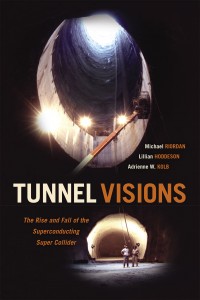Michael Riordan on United Technologies

Michael Riordan, coauthor of Tunnel Visions: The Rise and Fall of the Superconducting Supercollider penned a recent op-ed for the New York Times on United Technologies and their subsidiary, the air-conditioning equipment maker Carrier Corporation, who plans “to transfer its Indianapolis plant’s manufacturing operations and about 1,400 jobs to Monterrey, Mexico.” Read a brief excerpt below, in which the author begins to untangle a web of corporate (mis)behavior, taxpayer investment, government policy, job exports—and their consequences.
***
The transfers of domestic manufacturing jobs to Mexico and Asia have benefited Americans by bringing cheaper consumer goods to our shores and stores. But when the victims of these moves can find only lower-wage jobs at Target or Walmart, and residents of these blighted cities have much less money to spend, is that a fair distribution of the savings and costs?
Recognizing this complex phenomenon, I can begin to understand the great upwelling of working-class support for Bernie Sanders and Donald J. Trump — especially for the latter in regions of postindustrial America left behind by these jarring economic dislocations.
And as a United Technologies shareholder, I have to admit to a gnawing sense of guilt in unwittingly helping to foster this job exodus. In pursuing returns, are shareholders putting pressure on executives to slash costs by exporting good-paying jobs to developing nations?
The core problem is that shareholder returns — and executive rewards — became the paramount goals of corporations beginning in the 1980s, as Hedrick Smith reported in his 2012 book, “Who Stole the American Dream?” Instead of rolling some of the profits back into building their industries and educating workers, executives began cutting costs and jobs to improve their bottom lines, often using the proceeds to raise dividends or buy back stock, which United Technologies began doing extensively last year.
And an easy way to boost profits is to transfer jobs to other countries.
To read more about Tunnel Visions, click here.